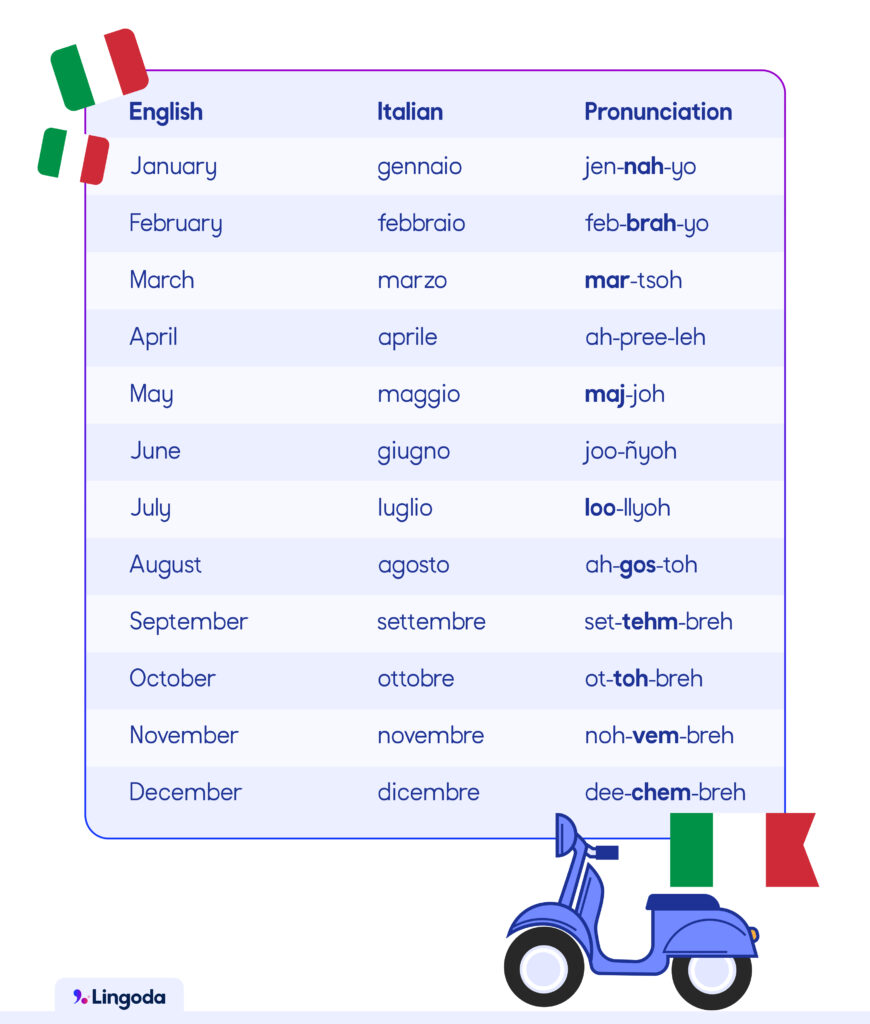How to say the months of the year in Italian

From gennaio (January) to dicembre (December), each month of the year wraps up traditional celebrations and holidays Italians cherish. Carnival, the Festa della Repubblica (Day of the Republic), Ferragosto and la vendemmia (harvest season) are all important events on the Italian calendar. If you don’t learn how to say the months of the year in Italian, you might just miss them! So, to keep the festivities going all year round, it’s best to get these nouns down pat.
In this guide, we’ll cover the names of the months in Italian and share some grammatical tips to apply when using them. We’ll also review some related terminology as well as a short limerick to help with memorization.

Learn Italian with Lingoda
How it works

The basics: names of the months in Italian
Let’s tackle the basics first. Below, you’ll find a list of the months of the year in Italian, plus guidance on how to pronounce them.

Rules around the months of the year in Italian
Adding to the names of the months in Italian, here are some rules you should consider when using them in a sentence or conversation:
Capitalization
In Italian, the months of the year are considered common nouns rather than proper nouns. As such, they are never capitalized unless starting a sentence.
- Il mio compleanno è in ottobre. (My birthday is in October.)
- Febbraio è il mese più corto dell'anno. (February is the shortest month of the year.)
Months gender and adjective agreement
The months of the year are all masculine. Knowing this will be handy when you need to ensure noun-adjective agreement.
See two examples below:
- Febbraio è il mese più corto dell'anno. (February is the shortest month of the year.)
- L’anno scorso abbiamo avuto un luglio ed agosto caldissimi. (Last year the months of July and August were very hot.)
In both instances, the adjective agrees with the noun and is declined in its masculine forms.
Preposition you should use when talking about months in Italian
Months in Italian tend to go along with a few prepositions:
| Preposition | Use | Example |
| ‘in’ and ‘a’ | To describe something happening during a specific month. These prepositions are interchangeable. | L’anno scolastico inizia in settembre. (The school year starts in September.) A febbraio si celebra il Carnevale. (In February Carnival is celebrated.) or L’anno scolastico inizia a settembre. (The school year starts in September.) In febbraio si celebra il Carnevale. (In February Carnival is celebrated.) |
| ‘nel’ + ‘mese di…’ | It only works in the context of the phrase “nel mese di,” meaning “in the month of.” | Nel mese di maggio sbocciano i primi fiori. (In the month of May, the first flowers start to blossom.) |
| ‘da…a’ | To outline a range or a period between two months. | Siamo chiusi per rinnovo da marzo a maggio. (We are closed for renovations from March until May) |
| ‘da’ | It translates to “from…” or “starting from…”. | Da ottobre saremo nella nuova casa. (From October we’ll be in the new house.) |

Learn Italian with Lingoda
How it works

Next (prossimo) and last (scorso)
To add specificity to your narration, you can use the adjectives prossimo (next) and scorso (last) to describe which month you refer to. If you do so, ensure to add the determinate article il or lo respectively before the adjective. Check the examples:
- Il prossimo settembre inizierò l'università. (Next September I'll start university.)
Note the structure: determinate article 'il' + prossimo (declined in masculine singular) + month
- Lo scorso agosto sono andati in vacanza in Grecia. (Last August they went to Greece on holiday.)
Here the structure shows: determinate article 'lo' + scorso (declined in masculine singular) + month
Exception: To translate the phrases "next month" and "last month", use 'il' + prossimo/scorso + mese
- Il mese prossimo giocherete la finale. (Next month you'll be playing the final.)
- Il mese scorso era malata. (Last month she was ill.)
Writing dates using the months of the year in Italian
Here are three ways to write correctly dates:
1. A specific date with no explicit day of the week: determinate article 'il' + date + month.
- Il 4 maggio (May 4)
- Il 16 novembre (November 16)
2. A specific date with an explicit day of the week: use the formula day + date + month, as shown below.
- Sabato 15 agosto (Saturday, August 15)
- Tornerò giovedì 25 dicembre (I'll be back on Thursday, December 25.)
3. When using primo (first) - for this exception, you'll need to add the article 'il' before the adjective.
- Il primo maggio è giorno di festa. (May 1st is a bank holiday.)
Fun facts and cultural insights about Italian months
Italian traditions and major events spread throughout the year and each month you'll surely come across some celebrations. Some of them have a religious background, others are tied to historic events. With the country divided into 20 Italian regions, keep in mind that some recurrences might not occur in all of them. Let's have a look at the major ones.
Gennaio
- The year kicks off with the primo dell'anno, or January 1st. This day is usually a bank holiday; while some families rest after the night before celebrations, others might gather for a meal.
- Epifania, on January 6, is a beloved day for kids! The Befana, a witch-like old lady flies on her broom and delivers sweets to those who behaved good and (sugary) coal to those who were bad. It's a tradition celebrated especially in Venice and Rome.
Febbraio
- The Carnevale is indeed the biggest festival in Italy in February and lasts for several weeks. While the most renowned are Venice's and Viareggio's, parades and celebrations take place across the whole country. Note, that depending on Easter's dates, it might slide into March too.
Marzo
- For International Women's Day (Festa della Donna), on March 8, it's custom to gift your women friends or relatives a bouquet of mimosas, a spongy round flower that has been the symbol of the women's movement in Italy.
- Nationwide, Italians celebrate Father's Day which coincidentally is also St. Joseph's Day on March 19.
- Easter (Pasqua) also falls in this month, however, the dates change each year. If you're around for these celebrations, you might spend Easter Monday (Pasquetta) outdoors, having a picnic with friends or family.
Aprile
- One of the most incredible cities in the world celebrates its birthday on April 21. Tanti auguri, Roma! If you are in the capital city, don't miss the costumed parades.
- April 25 is la Festa della Repubblica and stands to commemorate the end of the Nazi occupation in 1945.
Maggio
- May 1 is Labor Day in Italy too (la Festa del Lavoro). For this day, expect huge celebrations and concerts. It’s a bank holiday, so most shops will be closed and transportation limited.
Giugno
- Republic Day, or la Festa della Repubblica, happens on June 2. This day celebrates the abolition of the monarchy and the establishment of the Republic of Italy in 1946. In Rome's city center, a military parade is held.

Learn Italian with Lingoda
How it works

Luglio
- July equals summer vibes and music festivals taking place across the whole country. One of the most famous ones is the Umbria Jazz Festival.
- The first of two horse races, typical for the Palio di Siena (Tuscany) is also held on July 2.
- On the third weekend of the month, Venice dresses up and celebrates la Festa del Redentore (Feast of the Redeemer) marking the end of the 1576 plague, that killed around 50.000 people. The Sunday fireworks show is something not to miss out on.
Agosto
- Most Italians will take their holidays this month and many establishments (especially smaller ones) will be closed.
- Ferragosto, on August 15 is a national bank holiday. Fun fact: this celebration dates back to the time of Emperor Augustus.
- The second and last horse race for the Palio di Siena also occurs mid-August.
Settembre
- In September children go back to school and harvest season kicks off. All around Tuscany, Piedmont and Sicily, harvest festivals are organized.
- One of the oldest film festivals in the world is held each year at the Lido di Venezia.
Ottobre
October is the best month to sample some of the delicacies Italy has to offer, from wine to white truffle and from Sicilian pistachios to the finest chocolate.
Novembre
- November 1 is All Saints’ Day (Ognissanti or simply I Santi) and it's a national holiday.
- On November 30, the Feast of Santa Lucia (Festa di Santa Lucia) begins and celebrations will continue deep into December in Siracusa, Sicily.
Dicembre
December is a month packed with celebrations, mainly religious ones. The main ones are:
- San Nicola, or Feast of Saint Nicholas, Bari's patron saint, on December 6.
- Sant'Ambrosio, or Feast of Saint Ambrose, Milan's patron saint, on December 7.
- L'Immaccolata Concezione (Feast of the Immaculate Conception) officially marks the start of the holiday season in Italy on December 8.
- Santa Lucia's celebrations peak on this day in Siracusa, Sicily. It's also celebrated in the Verona province.
- From December 24 to 26, Italians celebrate Christmas. These days respectively mark la vigilia (Christmas Eve), Natale (Christmas Day), and Santo Stefano (Saint Stephen’s Day) and are bank holidays nationwide.
- Capodanno, New Year's Eve, marks the end of the calendar with huge celebrations in all main cities and private gatherings among families and friends.
A trick to remember the months in Italian
They say every little bit helps when learning a new language. And that’s true of memorization techniques, too. Fortunately, there’s a short limerick designed to help you remember not only the name of the months in Italian but also their duration.
Trenta giorni ha novembre
con april, giugno e settembre.
Di ventotto ce n'è uno,
tutti gli altri ne han trentuno.
Translation:
November has 30 days,
along with April, June and September.
Only one month has 28 days.
All the others have 31 days.
Additional vocabulary around the months of the year in Italian
We’ve nearly reached the end of this vocabulary guide on the months of the year in Italian. Before you go, though, here’s an additional gift: some related vocabulary that will prove useful in situations when you need to speak about this topic.
| English | Italian |
| month/months | il mese/i mesi |
| season/seasons | la stagione/le stagioni |
| spring | la primavera |
| summer | l’estate |
| autumn/fall | l’autunno |
| winter | l’inverno |
| week/weeks | la settimana/le settimane |
| calendar | il calendario |
| bank holiday | il giorno festivo |
FAQs
What are the 12 months in Italian?
The twelve months are gennaio (January), febbraio (February), marzo (March), aprile (April), maggio (May), giugno (June), luglio (July), agosto (August), settembre (September), ottobre (October), novembre (November) and dicembre (December). They are common nouns, so you don't capitalize them unless they start a sentence. They are all masculine.
What month is OTT in Italian?
Ott. is the Italian abbreviation for the month of ottobre (October). The other months are abbreviated as follows: gen. (gennaio), feb. (febbraio), mar. (marzo), apr. (aprile), mag. (maggio), giu. (giugno), lug. (luglio), ago. (agosto), set. (settembre), nov. (novembre) and dic. (dicembre).
Don’t miss out on Italian celebrations
Knowing the months of the year will surely help you progress when learning Italian. If you are interested in studying this language, Lingoda is the solution for you. We offer Italian A1 courses, and we guarantee a full immersion from your very first day in class. Choose between private classes or the smallest group classes in the market and start practicing with our certified, native-level teachers. Remember that, while these names are usually used in particular situations, mastering their pronunciation and use will boost your confidence. With this terminology, you will for sure not miss out on any celebration or important event in the Italian calendar!

Learn Italian with Lingoda
How it works














